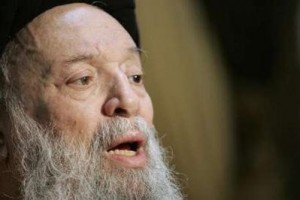 By: Octavia Nasr
By: Octavia Nasr
My tweet was short: “Sad to hear of the passing of Sayyed Mohammad Hussein Fadlallah.. One of Hezbollah’s giants I respect a lot. #Lebanon”
Reaction to my tweet was immediate, overwhelming and provides a good lesson on why 140 characters should not be used to comment on controversial or sensitive issues, especially those dealing with the Middle East.
It was an error of judgment for me to write such a simplistic comment and I’m sorry because it conveyed that I supported Fadlallah’s life’s work. That’s not the case at all.
Here’s what I should have conveyed more fully:
I used the words “respect” and “sad” because to me as a Middle Eastern woman, Fadlallah took a contrarian and pioneering stand among Shia clerics on woman’s rights. He called for the abolition of the tribal system of “honor killing.” He called the practice primitive and non-productive. He warned Muslim men that abuse of women was against Islam.
I met Fadlallah in 1990. He was willing to take the risk of meeting with a young Christian journalist from the Lebanese Broadcasting Corporation. Fadlallah was at the height of his power. As I was ushered in, I was told that he would not look at me in the eye and to make it quick as there was a long line of dignitaries waiting.
The interview went 45 minutes, during which I asked him about Hezbollah’s agenda for an Islamic state in Lebanon. He bluntly told me that was his group’s dream but there would be room for other religions. He also joked at the end of the interview that the solution for Lebanon’s civil war was to send “all political leaders without exception on a ship away from Lebanon with no option to return.”
He challenged me to run the entire interview on LBC without editing. We did.
This does not mean I respected him for what else he did or said. Far from it.
It is no secret that Sayyed Mohammad Hussein Fadlallah hated with a vengeance the United States government and Israel. He regularly praised the terror attacks that killed Israeli citizens. And as recently as 2008, he said the numbers of Jews killed in the Holocaust were wildly inflated.
But it was his commitment to Hezbollah’s original mission – resisting Israel’s occupation of Lebanon – that made him popular and respected among many Lebanese, not just people of his own sect.
In 1983, as Fadlallah found his voice as a spiritual leader, Islamic Jihad – soon to morph into Hezbollah – bombed the U.S. Marine barracks in Beirut, killing 299 American and French peacekeepers. I lost family members in that terror attack.
And it was during his time as spiritual leader that so many Westerners were kidnapped and held hostage in Lebanon.
When the Lebanese Civil War ended in 1990 with Syria taking full control of Lebanon, Hezbollah was and remains the only armed militia in Lebanon. Under Syria’s influence however, Hezbollah – declared a terrorist group by the United States and the European Union started becoming even more militant, with designs beyond Lebanon’s borders to serve agendas for Syria and Iran.
Fadlallah himself was designated a terrorist by the U.S. Treasury Department.
In later years, Hezbollah’s leadership apparently did not like Fadlallah’s vocal criticism of Hezbollah’s allegiance to Iran. Nor did they like his assertions that Hezbollah’s leaders had been distracted from resistance to Israeli occupation of portions of Lebanon and had turned weapons against their own people.
At first, he was simply pushed to the side, but later wasn’t even referred to as a Hezbollah member. Rather, he was referred to as the scholar – the expert on Islam – but nothing more. During the 2006 war between Hezbollah and Israel, his honorary title “Sayyed” – indicating that he’s a descendant of the prophet – was dropped any time he was mentioned on Hezbollah’s Al-Manar TV and other Hezbollah media outlets.
Through his outspoken Friday sermons and his regularly updated website, Fadlallah had a platform to spread what many considered a more moderate voice of Shia Islam than what was coming out of Iran. Immensely popular in Lebanon among the various religious groups, he also had followers across the region including in Saudi Arabia, the UAE, Kuwait, Bahrain and even as far as Morocco in northern Africa.
Sayyed Fadlallah. Revered across borders yet designated a terrorist. Not the kind of life to be commenting about in a brief tweet. It’s something I deeply regret. CNN

Leave a Reply
You must be logged in to post a comment.